For the 2025 school year, there is 1 public school serving 33 students in Valley View Elementary School District. This district's average testing ranking is 4/10, which is in the bottom 50% of public schools in Montana.
Public School in Valley View Elementary School District have an average math proficiency score of 20% (versus the Montana public school average of 36%), and reading proficiency score of 50% (versus the 46% statewide average).
Minority enrollment is 12% of the student body (majority American Indian), which is less than the Montana public school average of 23% (majority American Indian).
Overview
This School District
This State (MT)
# Schools
1 School
843 Schools
# Students
33 Students
149,705 Students
# Teachers
3 Teachers
10,942 Teachers
Student : Teacher Ratio
11:1
11:1
District Rank
Valley View Elementary School District, which is ranked within the bottom 50% of all 347 school districts in Montana (based off of combined math and reading proficiency testing data) for the 2021-2022 school year.
Overall District Rank
#225 out of 350 school districts
(Bottom 50%)
(Bottom 50%)
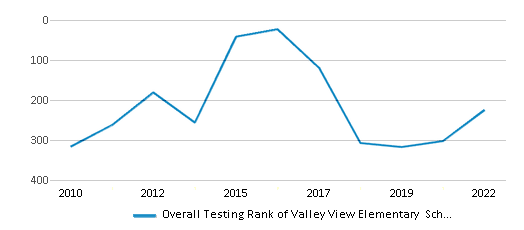
Math Test Scores (% Proficient)
≤20%
35%
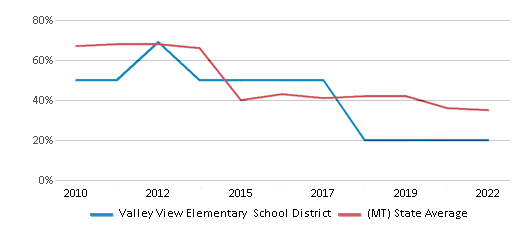
Reading/Language Arts Test Scores (% Proficient)
40-59%
46%
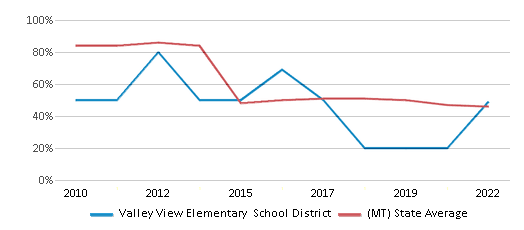
Students by Ethnicity:
Diversity Score
0.22
0.40
# American Indian Students
2 Students
15,756 Students
% American Indian Students
6%
10%
# Asian Students
n/a
944 Students
% Asian Students
n/a
1%
# Hispanic Students
1 Student
9,249 Students
% Hispanic Students
3%
6%
# Black Students
n/a
1,034 Students
% Black Students
n/a
1%
# White Students
29 Students
114,928 Students
% White Students
88%
77%
# Hawaiian Students
n/a
284 Students
% Hawaiian Students
n/a
n/a
# Two or more races Students
1 Student
7,508 Students
% of Two or more races Students
3%
5%
Students by Grade:
# Students in PK Grade:
-
1,059
# Students in K Grade:
6
12,088
# Students in 1st Grade:
6
10,993
# Students in 2nd Grade:
9
11,771
# Students in 3rd Grade:
1
11,487
# Students in 4th Grade:
4
11,459
# Students in 5th Grade:
4
11,360
# Students in 6th Grade:
3
11,339
# Students in 7th Grade:
-
11,480
# Students in 8th Grade:
-
11,296
# Students in 9th Grade:
-
11,994
# Students in 10th Grade:
-
11,945
# Students in 11th Grade:
-
11,006
# Students in 12th Grade:
-
10,428
# Ungraded Students:
-
-
District Revenue and Spending
Total Revenue
$395,000
$2,285 MM
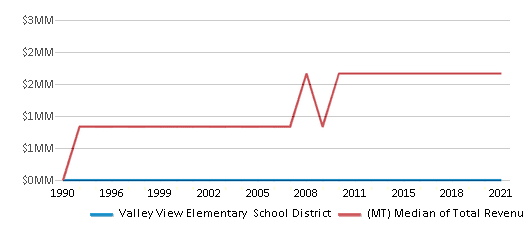
Spending
$399,000
$2,298 MM
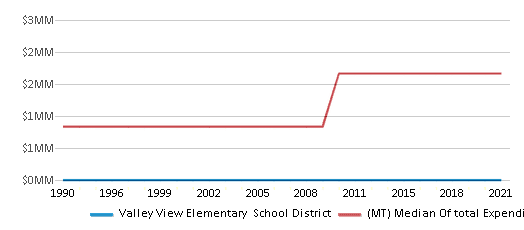
Best Valley View Elementary School District Public Schools (2025)
School
(Math and Reading Proficiency)
(Math and Reading Proficiency)
Location
Grades
Students
Rank: #11.
Valley View School
(Math: ≤20% | Reading: 40-59%)
Rank:
Rank:
4/
Bottom 50%10
42448 Valley View Road
Polson, MT 59860
(406) 883-2208
Polson, MT 59860
(406) 883-2208
Grades: PK-6
| 33 students
Frequently Asked Questions
How many schools belong to Valley View Elementary School District?
Valley View Elementary School District manages 1 public schools serving 33 students.
What is the rank of Valley View Elementary School District?
Valley View Elementary School District is ranked #238 out of 347 school districts in Montana (bottom 50%) based off of combined math and reading proficiency testing data for the 2021-2022 school year.
What is the racial composition of students in Valley View Elementary School District?
88% of Valley View Elementary School District students are White, 6% of students are American Indian, 3% of students are Hispanic, and 3% of students are Two or more races.
What is the student/teacher ratio of Valley View Elementary School District?
Valley View Elementary School District has a student/teacher ratio of 11:1, which is lower than the Montana state average of 14:1.
Recent Articles

Year-Round Or Traditional Schedule?
Which is more appropriate for your child? A year-round attendance schedule or traditional schedule? We look at the pros and cons.

Why You Should Encourage Your Child to Join a Sports Team
Participating in team sports has a great many benefits for children, there is no doubt. In this article you will learn what those benefits are.

White Students are Now the Minority in U.S. Public Schools
Increasing birth rates among immigrant families from Asia and Central and South America, combined with lower birth rates among white families, means that for the first time in history, public school students in the United States are majority-minority. This shift in demographics poses difficulties for schools as they work to accommodate children of varying language abilities and socio-economic backgrounds.





